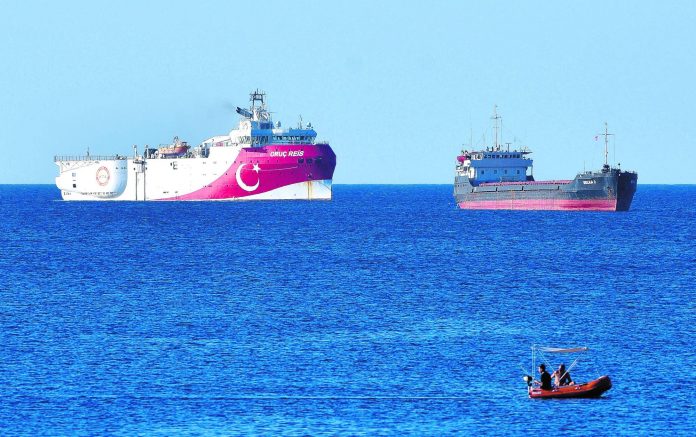
Greece warned Thursday it will do “whatever is necessary” to defend its sovereign rights in response to plans by neighboring Turkey to proceed with an oil-and-gas research mission south of Greek islands in the eastern Mediterranean.
The dispute over seabed mineral rights has led to increased navy deployments by both NATO members in the region, where a Turkish research vessel, the Oruc Reis, is being prepared for a survey mission.
Turkey has drawn growing criticism from Western allies, with French President Emmanuel Macron joining calls for European Union sanctions against Ankara if the dispute escalates further.
Greek government spokesman Stelios Petsas described the mission as a direct violation of Greek sovereignty and that of Greek ally Cyprus.
“The government is underlining to all parties that Greece will not accept a violation of its sovereignty and will do whatever is necessary to defend its sovereign rights,” Petsas said.
Macron said sanctions now appeared necessary.
“It is not acceptable for the maritime space of a Union member state to be violated or threatened. Those responsible must be sanctioned,” Macron said before talks in Paris with Cypriot counterpart Nicos Anastasiades at the presidential Elysee Palace
Greece and Turkey have been at odds for decades over sea boundaries but recent discoveries of natural gas and drilling plans across the East Mediterranean have exacerbated the dispute.
Turkey argues Greek islands should not be included in calculating maritime zones of economic interest — a position that Greece says is a clear violation of international law. Greece has around 6,000 islands and smaller islets in the Aegean and Ionian Seas, more than 200 of them inhabited.
The survey ship Oruc Reis remains anchored off the port of Antalya, in southeastern Turkey, but a navigational telex issued by the port says the mission planned through Aug. 2 remains “valid and effective.” In Ankara, Turkish President Recep Tayyip Erdogan said he had full confidence in the capability of his country’s military. “Historic successes on different fronts, from Syria to Libya, from the eastern Mediterranean to the fight against terrorism, demonstrate the strength of our country and the capabilities of our armed forces,” Erdogan said before he chaired an annual meeting of the country’s Supreme Military Council.
Erdogan’s spokesman, Ibrahim Kalin, said Thursday: “We want all natural resources in the eastern Mediterranean to be shared fairly.”
“We will never accept threats or sanctions,” the state-run Anadolu quoted him as saying. “We do not accept Greece’s maximalist position.”
But EU and U.S. officials have become increasingly blunt in their calls on Turkey to halt its survey plans.
“I want to echo the clear message from Washington and elsewhere in Europe, urging Turkish authorities to halt operations that raise tensions in the region, such as plans to survey for natural resources in areas where Greece and Cyprus assert jurisdiction in the Eastern Mediterranean,” said Geoffrey Pyatt, the U.S. ambassador to Greece.
“This is a complex strategic space. We want our friends and allies in the region to approach resource development in the spirit of cooperation … Unilateral provocative actions were against this aim.” Pyatt spoke in the northeast Greek port of Alexandroupolis, where around 2,000 U.S. service members, dozens of helicopters and hundreds of vehicles disembarked. They were to take part in multinational training exercises and be sent to several NATO countries as part of regular troop rotation.
___



















